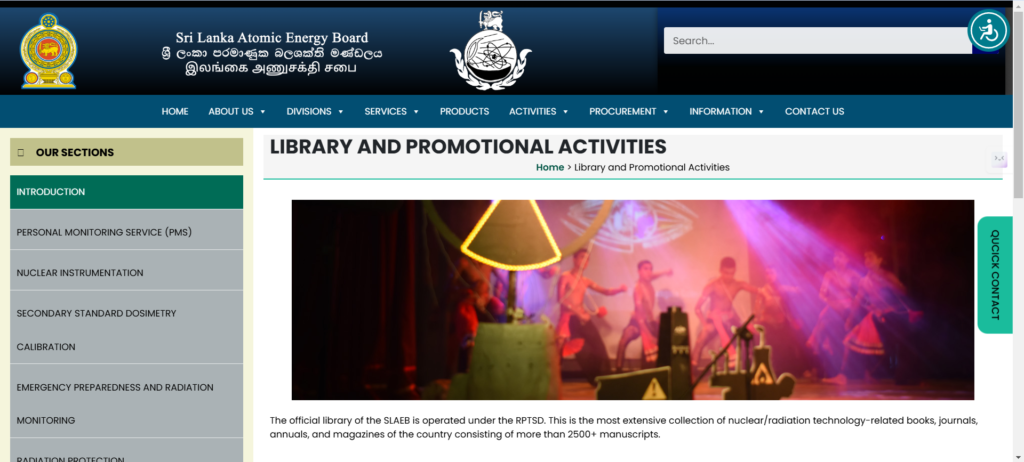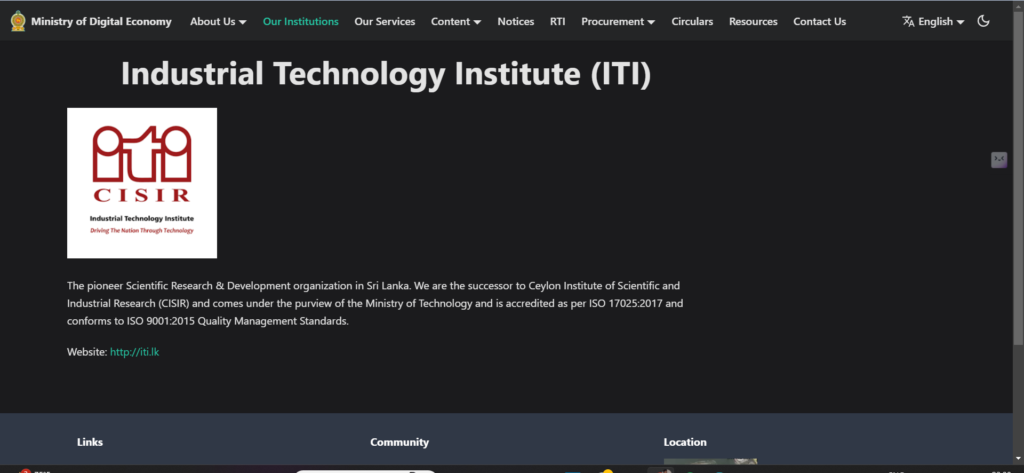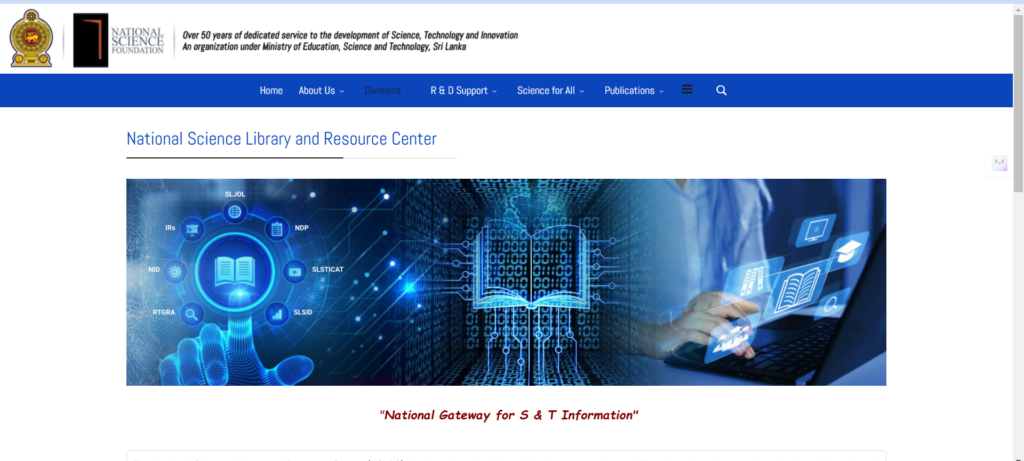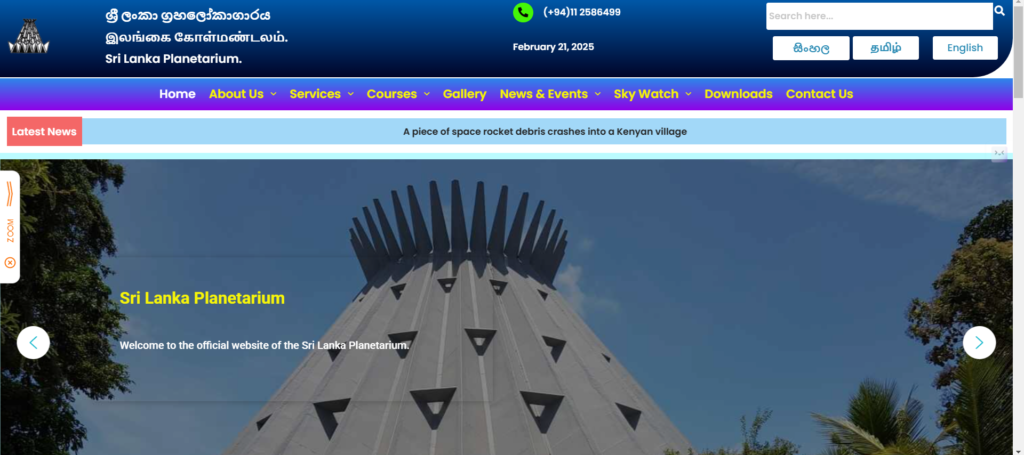Sri Lanka, an island nation renowned for its cultural heritage and natural beauty, is also home to a thriving science and technology sector. The country has made significant strides in research, development, and technological innovation, thanks to the work of several notable institutions. Science and technology libraries in Sri Lanka are crucial in supporting these advancements, providing researchers, students, and the public with valuable resources and facilities for learning and exploration. This blog will explore some of the major science and technology libraries and institutions in Sri Lanka, including the Arthur C. Clarke Institute for Modern Technologies, Atomic Energy Authority, Industrial Technology Institute, National Science and Technology Commission, National Engineering Research and Development Centre, National Science Library & Resource Centre, and the Sri Lanka Planetarium.
1. Arthur C. Clarke Institute for Modern Technologies (ACCCMT)

The Arthur C. Clarke Institute for Modern Technologies (ACCCMT) was established in 1984, named after the celebrated science fiction writer Sir Arthur C. Clarke, who was passionate about space and technological innovation. Located in Moratuwa, the institute has become a beacon for research in electronic communication, space technology, and robotics. ACCCMT offers a specialized library that provides a wide range of resources, from scientific journals and research publications to technical manuals on space science and satellite communications.
ACCCMT’s library is crucial for researchers interested in space technology, telecommunications, and the advancements in artificial intelligence and robotics. By facilitating access to cutting-edge resources, ACCCMT’s library helps position Sri Lanka as a contributor to the global scientific community, particularly in satellite technology and other modern communication systems.
2. Atomic Energy Authority (AEA)

The Atomic Energy Authority (AEA) is Sri Lanka’s primary institution for atomic energy research, management, and education. The AEA was established to promote the peaceful applications of atomic energy and ensure the safe and secure handling of radioactive materials. Its library contains extensive resources on nuclear physics, radiology, radiation protection, and environmental monitoring, supporting research in atomic energy for peaceful purposes, such as medical imaging, agriculture, and environmental preservation.
Through its specialized library, the AEA provides information essential for professionals, scientists, and policymakers involved in nuclear science and its applications. The library’s resources serve as a valuable foundation for understanding nuclear technology and its potential benefits, helping Sri Lanka harness atomic energy for medical, agricultural, and industrial applications while ensuring safety and environmental protection.
3. Industrial Technology Institute (ITI)

The Industrial Technology Institute (ITI), originally established as the Ceylon Institute of Scientific and Industrial Research, is a government-funded research organization focused on industrial and scientific research. Based in Colombo, ITI conducts research in food technology, material science, environmental science, and biotechnology, contributing significantly to industrial development and innovation in Sri Lanka.
The ITI library supports these efforts with an impressive collection of resources on various industrial and scientific subjects, including access to databases, journals, technical reports, and research publications. The ITI library is particularly useful for scientists, entrepreneurs, and industrialists seeking to apply scientific research in real-world applications, especially in agriculture, environmental protection, and manufacturing. Its focus on applied research resources allows researchers and businesses to access practical solutions that enhance productivity and sustainability.
4. National Science and Technology Commission (NASTEC)

The National Science and Technology Commission (NASTEC) is the apex body for science, technology, and innovation policy in Sri Lanka. Established by an Act of Parliament, NASTEC’s primary role is to advise the government on policy formulation and support the coordination and promotion of scientific research across the nation.
NASTEC’s library and resource center offer policy documents, research papers, and publications related to science and technology, providing a resource-rich environment for policymakers, researchers, and students. The library’s focus on policy research and technology assessments makes it an essential resource for understanding Sri Lanka’s science and technology landscape, guiding stakeholders in strategic decision-making processes.
5. National Engineering, Research and Development Centre (NERDC)

The National Engineering Research and Development Centre (NERDC) is Sri Lanka’s leading institute for engineering research, development, and innovation. NERDC’s mandate includes promoting engineering solutions to enhance the quality of life and address the challenges of infrastructure, water resources, and energy.
NERDC’s library is a key resource for engineering professionals and students, providing access to technical documents, research journals, and blueprints for innovative engineering projects. The resources are particularly beneficial for civil, mechanical, and environmental engineers, as well as for researchers looking for sustainable solutions to Sri Lanka’s engineering challenges. From renewable energy to infrastructure design, NERDC’s library helps engineers develop practical skills and knowledge to support the nation’s development goals.
6. National Science Library & Resource Centre (NSLRC)

The National Science Library & Resource Centre (NSLRC), located in Colombo, is one of Sri Lanka’s premier scientific libraries. NSLRC is part of the National Science Foundation and serves as a central repository of information for scientific research, publications, and data. It provides a vast collection of resources across various fields, including natural sciences, engineering, and technology.
NSLRC supports a wide range of users, from university students and educators to researchers and government officials. The library provides access to a variety of journals, digital resources, and research databases, enabling users to stay updated with the latest scientific trends. NSLRC also offers a range of services, such as interlibrary loans, bibliographic services, and access to both local and international scientific publications. Its role in fostering scientific literacy and research excellence makes NSLRC a pillar of Sri Lanka’s scientific community.
7. Sri Lanka Planetarium

The Sri Lanka Planetarium, located in Colombo, was established in 1965 and is dedicated to promoting public interest in astronomy and space science. The planetarium provides educational programs, guided tours, and night-sky observation events, offering a unique platform for learning about the universe.
The planetarium’s library, though small, contains specialized resources in astronomy, astrophysics, and space science. The library’s resources are used by students, educators, and astronomy enthusiasts alike, providing valuable information on topics such as planetary science, celestial mechanics, and the history of space exploration. The planetarium itself plays an educational role, hosting regular shows and activities that help popularize astronomy in Sri Lanka.
Sri Lanka’s science and technology institutions and libraries are instrumental in advancing knowledge, innovation, and economic growth. From the Arthur C. Clarke Institute’s contributions to space technology and robotics to the Atomic Energy Authority’s role in nuclear science, these institutions foster a culture of research and learning. Libraries at these institutions play a critical role in supporting research, education, and public awareness in diverse fields, such as engineering, biotechnology, astronomy, and environmental science.
The efforts of these libraries and institutions contribute significantly to Sri Lanka’s progress in science and technology, enhancing the nation’s capacity for innovation and empowering its citizens with knowledge. As Sri Lanka continues to grow as a hub for scientific and technological research, the support provided by these libraries will be essential in fostering an environment where discovery, learning, and innovation can thrive.








